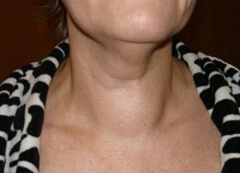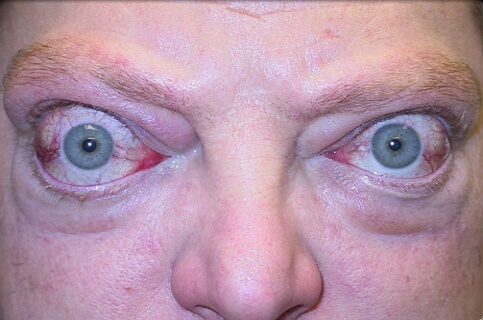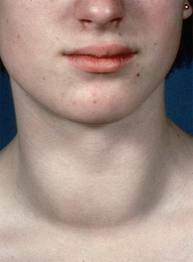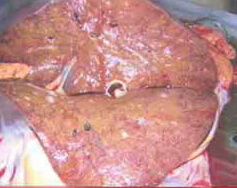Thyrotoxicosis
 Thyrotoxicosis is a pathological condition caused by an excess of thyroid hormones in the body. Sometimes this condition is called - intoxication with thyroid hormones. In medical practice, the synonym of thyrotoxicosis is hyperthyroidism, which is manifested by an increase in thyroid function. However, the increase in thyroid function often occurs in everyday conditions( pregnancy in women, etc.), whereas the term thyrotoxicosis most fully reveals the meaning of the disease, namely, thyroid hormone poisoning.
Thyrotoxicosis is a pathological condition caused by an excess of thyroid hormones in the body. Sometimes this condition is called - intoxication with thyroid hormones. In medical practice, the synonym of thyrotoxicosis is hyperthyroidism, which is manifested by an increase in thyroid function. However, the increase in thyroid function often occurs in everyday conditions( pregnancy in women, etc.), whereas the term thyrotoxicosis most fully reveals the meaning of the disease, namely, thyroid hormone poisoning.
Thyrotoxicosis is a pathological condition, the reverse of hypothyroidism. The meaning of the difference is that when hypothyroidism the content of thyroid hormones is quite insignificant and the speed of all processes functioning in the human body is significantly reduced, whereas in thyrotoxicosis, on the contrary, maximum production of hormones with their highest activity is observed.
. Thyrotoxicosis - causes of
. The main cause of thyrotoxicosis is diffuseToxic goiter. It is observed in about 75% of patients. Usually this disease is hereditary and is observed together with other autoimmune diseases( autoimmune thyroiditis, etc.).Thyrotoxicosis is not an independent disease, but is a whole complex of symptoms, which is observed in such diseases as Basedova's disease, pituitary adenoma, thyrotoxic adenoma, multinodular hyperthyroid goiter, subacute thyroiditis.
Thyrotoxicosis is significantly less likely to be caused by excessive administration of thyroid hormones( triiodothyronine, thyroxine) into the body, which are used as a substitution therapy after incomplete thyroid resection, after removal of the entire gland, with hypothyroidism.
Thyrotoxicosis may first occur in infants, in older children, or in adults. Predisposition to the development of the disease usually lasts a lifetime. Previously, thyrotoxicosis was necessarily associated with a diffuse toxic goiter, but a few later were classified and other thyrotoxicosis-associated diseases. In 1961, diffuse toxic goiter was officially recognized as a thyroid disease, while thyrotoxicosis was also defined as a symptomatic complex due to an excess of thyroid hormones in the blood.
There is a version that patients with a progressive stage of the disease have abnormal thyroid-stimulating hormones receptors, which their own immune defense perceives as alien. The second option deals with immunity disorders, which consist in not hindering the immune response against their tissues.
Forms of thyrotoxicosis
• Easy form of thyrotoxicosis. For this form is characterized by a slight weight loss, tachycardia in mild form( palpitation of the order of 100 beats per minute).Dysfunction is observed exclusively in the thyroid gland, heart contractions remain normal, other organs are not affected by
. • Average form of thyrotoxicosis. With this form of the patient significantly loses weight, the heartbeat is quite high( about 120 beats per minute).Tachycardia becomes permanent, and it is not affected by sleep or body position changes. The average form is characterized by digestive disorders that lead to symptoms of adrenal insufficiency and diarrhea, temporary changes in the heartbeat, problems with carbohydrate metabolism, a decrease in the level of cholesterol
• Severe form of thyrotoxicosis. This form is observed in the cases previously observed violations of the proper functioning of the thyroid gland, which have not been completely cured, or the treatment itself was not assigned correctly. Severe form of the disease leads to severe organ dysfunction and
systems usually cause of the above-described forms thyrotoxicosis protrudes diffuse toxic goiter, however, sometimes cause of the disease may be a large number of falling from the environment into the body of the thyroid hormones and high iodine content( the use of iodine-containing formulations) 
Thyrotoxicosis - symptoms of
People suffering from thyrotoxicosis complain of feelings of fear and anxiety, increased irritability, sweating, Sleep disturbance;Trembling of the trunk, tongue and fingers;palpitations, rapid weight loss, pain in the heart, nausea, vomiting, diarrhea, exophthalmos, decreased, or on the contrary an increase( in mild / medium form) appetite.
Initially, the liver function is not impaired, but as the symptoms of thyrotoxicosis increase, a significant increase in the liver is observed. The concentration of bilirubin in the blood rises, jaundice can develop. In severe long-term thyrotoxicosis, impaired function of the sexual glands is observed( in men - gynecomastia and decreased potency, in women - amenorrhea and dysmenorrhea).Perhaps the appearance of symptoms of thyroid diabetic.
Almost 100% of patients have a decrease in mental activity, emotional disorders, asthenia. With severe thyrotoxicosis, the basal metabolism reaches 100%.With prolonged current disease, the metabolism and catabolism of proteins is enhanced, which can serve as an impetus to the development of such a disease as osteoporosis. From the side of the cardiovascular system, a whole complex of disorders develops, which was called "thyrotoxic heart".Disturbances from the circulatory system include increased heart rate, increased circulating blood volume and blood flow velocity. Often, the noise and intensification of the heart sounds( more often on the apex of the heart), a gradual increase in the left ventricle, and after him the whole heart.
Isolate a special form of thyrotoxicosis, which against the background of a bradycardia or a normal rhythm is manifested by attacks of the tahisystolic form of atrial fibrillation, with absent symptomatology of toxic goiter.
When the thyroid gland is enlarged in size, patients have complaints of an increase in the volume of the neck and a violation of swallowing. Diffuse toxic goiter is characterized by manifestations of infiltrative ophthalmopathy - photophobia, lacrimation, feeling of sand and pressure in the eyes, doubling in gases, decreased vision. Also, special attention is drawn to the exophthalmos manifested in the protrusion of eyeballs
Thyrotoxicosis - treatment of
To determine the correct tactics for treating thyrotoxicosis, its cause is primarily determined. Most often it is a diffuse toxic goiter. For this disease, three main methods of treatment are developed - treatment with radioactive iodine, conservative and surgical treatment.
Treatment of thyrotoxicosis with radioactive iodine is completely painless and consists in ingestion of a capsule or liquid with radioactive iodine, which gets into the body, accumulates in the gland cells and leads to their death and subsequent replacement with a connective tissue. Hypothyroidism is the main complication of treatment with this method. In such cases, life-long substitution therapy with thyroid hormones is indicated.
Conservative treatment of thyrotoxicosis consists in taking thyreostatic drugs( propylthiouracil, thiamazole), whose action is directed at suppressing the activity of the thyroid gland. Conservative treatment requires timely and accurate medication and regular visits to the endocrinologist. In addition, with the help of medicines, they try to compensate for violations of the autonomic nervous system, the hypothalamus and the central nervous system.
Surgical treatment of hyperthyroidism is conducted only in case of failure of conservative treatment, with retrosternal location goiter with suspected malignant tumor and significantly enlarged thyroid gland
hyperthyroidism in
children usually hyperthyroidism is diagnosed in children born to women who suffer from this disease in the past, Or having it in the present. In the development of thyrotoxicosis in newborns, a certain role is played by the acting thyroid stimulant and other thyroid stimulating antibodies, often detected in the blood of the mother and child and passing through the placental barrier.
As a rule, six to twelve weeks after birth, thyrotoxicosis occurs in newborns, but in exceptional cases it remains and continues for many years, accompanied by a typical clinical picture of diffuse toxic goiter. Children with thyrotoxicosis( usually boys) are usually born prematurely. The most distinctive feature of these children is the protruding convex forehead, many children have an enlarged thyroid gland, their body temperature is slightly elevated. Against the background of increased metabolism, a bad weight gain is characteristic, diarrhea, vomiting, sweating, anxiety, excitability, exophthalmos are observed. The following symptoms may also occur: spleen and liver enlargement, palpitations, jaundice, respiratory depression, thrombocytopenia, arrhythmia, enlargement of the heart, lymphoid tissue overdevelopment and edema. Radiographic examination of the skeleton clearly shows craniostenosis and accelerated development of the osseous system. In the blood there is a very low concentration or total absence of thyroid-stimulating hormone, with an increased content of thyroid hormones
More articles on the topic:
1. Hyperthyroidism
2. Peptic ulcer
3. Obesity of liver


